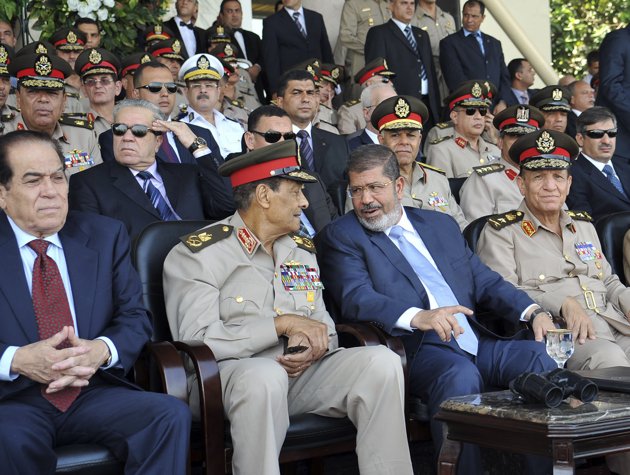
If it wasn’t obvious before that Egypt is being run with something akin to a power-sharing agreement between the Muslim Brotherhood and the military, Wednesday's papers make that clear with their top stories.
The first of these is the front-page of the state-owned newspaper Al-Ahram, which leads with the meeting of both President Mohamed Morsy and Field Marshal Hussein Tantawi with US Secretary of Defense Leon Panetta. The front-page photo is of Panetta sitting between the two, under the headline “Important discussions by the president and field marshal with the secretary of defense.”
The sub-heading is Panetta's praise of Tantawi for his role in the peaceful transfer of power and Egypt’s continued commitment to international treaties and accords. The article itself shows the effort made to include Tantawi as much as the sitting president, if not more. Morsy may be president, but state media does not belong to him like it did to his predecessor.
In another example that it’s takes two to tango, the independent daily Al-Shorouk leads with the story of a “truce” between the military and the Brotherhood over the continuation of the Constituent Assembly. Three pictures run with this story: those of Morsy, Tantawi and the Brotherhood’s Supreme Guide Mohamed Badie.
The story talks of a trilateral agreement among the military, the presidency and the Brotherhood over the articles that will be included in the new constitution. In exchange to preserving the existing protections for the military and maintaining a civil state, the military would not “veto” an article keeping Morsy as president, even if the authorities of the office are modified.
Former Brotherhood Deputy Surpeme Guide Mohamed Habib, who was expected to take over from Mahdi Akef, but was unceremoniously ousted in the move that saw Badie assume the top post, writes in his opinion column in the privately-owned daily Al-Watan that Morsy’s presidential win was “an unattainable dream” for the Brotherhood. He stresses that Morsy must seek counsel when making decisions. However, he also calls Morsy out for his refusal to clash with the military by writing that the president should leave issues of bread and garbage to the government he has formed while he focuses on the goals of the revolution. Military police must also stop killing and torturing, he writes.
Most newspapers also talk about the Cabinet about to be formed by new Prime Minister Hisham Qandil. Prevalent in the coverage is the fact that the Cabinet is being chosen through consensus between Morsy and the military. Al-Ahram reports that the Cabinet is expected to take the oath in front of Morsy today, though discussions over what are referred to as “sovereign” ministries (defense, interior and justice) continue. Al-Shorouk reports that Qandil is having trouble filling some posts after several candidates have refused his offers. Most difficult of all has been the post of deputy prime minister for economic affairs. Four from the field of finance and economics have reportedly turned it down due to the ambiguity of its mandate.
Al-Shorouk gets ahead of itself with another story, the gist of which says that former presidential scion Gamal Mubarak was behind the assassination attempt of late intelligence chief Omar Suleiman during the 18 days that ousted his father. It claims the story is an exclusive that it broke yesterday, which is now leading to complaints being filed against Mubarak junior at the public prosecutor’s office.
This story was actually first reported by columnist Jihad El Khazen of the pan-Arab newspaper Al-Hayat. He had interviewed Suleiman last May, and even though he did not run this particular part at the time, a week ago he wrote in his column that Suleiman believed Gamal was behind the assassination attempt, because the president’s son had felt that Suleiman had ruined his chances of assuming the presidency.
The independent Al-Tahrir runs an interview with Hussein Kamel, the head of Suleiman’s office and famously known in the country as the man who stood behind Omar Suleiman as he read the infamous and terse statement that Mubarak had stepped down on 11 February 2011. Kamel casts doubts that Gamal or his mother Suzanne could have been involved in the assassination attempt. He also alleges that Suleiman had no contact with Tantawi or anyone else from the military from the day Mubarak resigned, as the VP was considered retired.
Egypt’s papers:
Al-Ahram: Daily, state-run, largest distribution in Egypt
Al-Akhbar: Daily, state-run, second to Al-Ahram in institutional size
Al-Gomhurriya: Daily, state-run
Rose al-Youssef: Daily, state-run
Al-Dostour: Daily, privately owned
Al-Shorouk: Daily, privately owned
Al-Watan: Daily, privately owned
Al-Wafd: Daily, published by the liberal Wafd Party
Youm7: Daily, privately owned
Al-Tahrir: Daily, privately owned
Freedom and Justice: Daily, published by the Muslim Brotherhood's Freedom and Justice Party
Sawt al-Umma: Weekly, privately owned
Al-Arabi: Weekly, published by the Nasserist Party
Al-Nour: Official paper of the Salafi Nour Party




